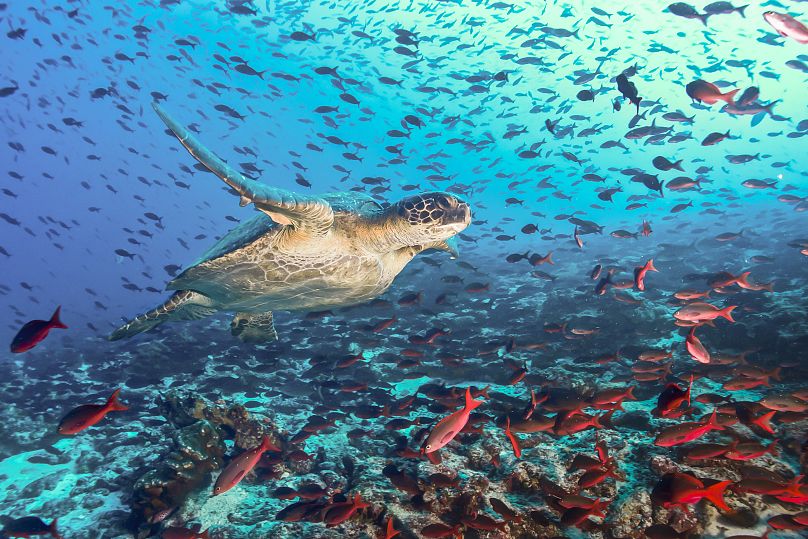From COP26 to Cambo, forests to the sea floor, we look back at some of campaigners' brightest victories over the last 12 months.
All the environmental victories that occurred in 2021 had one thing in common. They were set in motion years ago and were hauled across the line by people power. They are almost all a win over something too, with humanity pushing back against its own greed.
 ADVERTISEMENT
ADVERTISEMENT
 ADVERTISEMENT
ADVERTISEMENT
The environmental losses over the last 12 months have people at their centre too. Whether it’s decisions taken in oil executive boardrooms, or climate breakdown due to public inaction, however they come about, it’s the changes in the natural world that we observe with horror. Europe has 600 million fewer breeding birds than 40 years ago, scientists discovered last month, while one of Antarctica’s most important ice sheets is fracturing.
Chalking up wins and losses simplifies how interconnected our planetary systems are, of course.
Our understanding of the environment’s health is filtered through our imperfect lens. After all, it was only this week that the new hottest record in the Arctic (38C) from summer 2020 was officially recognised.
While some pioneering projects which launched this year - like an initiative to map the world’s underground fugal networks for the first time, and grasp their ecological potential - won’t be fully understood for years to come.
Even so, it’s good to take stock; to take heart from the wins - and note which ones are not quite in the bag yet, but require sustained pressure. Wins and losses might feel simplistic in the scheme of things. But they appeal to a human need to tell ourselves stories. And in December 2021, we need all the positive ones we can get.
7. COP26 agreements: 1.5C was (just about) kept alive
It’s a seriously compromised victory - few would describe the Glasgow Climate Summit as an overall “win” - but progress was made.
A major deal was forged to protect the world’s forests, with more than 100 leaders committing to end deforestation by 2030. The Glasgow Leaders’ Declaration on Forest and Land Use was signed by the majority of countries in the Amazon Rainforest, and has nearly €16.5 billion funding behind it - so the potential is huge. Now it’s up to us to hold leaders accountable, to stop the pledge falling short like the New York Declaration on Forests from seven years ago.
More than 100 countries also announced a new plan to curb methane emissions by 30 per cent. Methane is increasingly recognised as one of the most potent greenhouse gases, so this is another step in the right direction. And some strides were taken in the finance sector too.
“We can say with credibility that we have kept 1.5C within reach but its pulse is weak,” COP26 president Alok Sharma concluded. “It will only survive if we keep our promises, if we translate commitments into rapid action and if we deliver on the expectations set out in this Glasgow Climate Pact to increase ambition to 2030 and beyond.”
At the very least, the UN system lives to fight another day, and the new expectation for countries to improve their nationally determined contributions (NDCs) - their commitments to limit emissions - every year is a significant shift.
6. The Stop Cambo campaign sent Shell packing
Shell pulled out of Cambo this year. News that delighted activists around the world came late on 2 December, after six months of concerted campaigning to stop the development of a new North Sea oilfield.
People had a moral case, and they stated it clearly. "How can the UK host COP26 and claim to be a green leader, while facilitating projects like this?” said Scottish environmental scientist Mara. “We know from the IPCC report that extraction simply has to stop. It's a positive move that Shell has withdrawn though, and shows the power of public pressure and grassroots activism."
The fight over the seafloor near Scotland’s Shetland Islands is not over yet though. Siccar Point, which owns the remaining 70 per cent of the field, has indicated its intent to find a new investor. And, as others have pointed out, the UK government has yet to make a final call.
5. Polluters are losing in the courtroom
Speaking of Shell, the multinational oil and gas giant lost a landmark court case back in May. Judges in The Hague ordered the company to cut its carbon emissions by 45 per cent by 2030 in the Netherlands, after finding its policies were too vague.
Milieudefensie voor Veranderaars (Friends of the Earth Netherlands) began assembling the case in 2018, together with other charities and more than 17,000 co-plaintiffs. In an emotional statement read outside the court, lawyer Roger Cox said “people around the world are ready to sue oil companies in their own country, following our example.
“And not only that. Oil companies will become much more reluctant to invest in fossil fuels, polluting fuels. The climate has won today.”
To make it even easier for other activists to succeed, Milieudefensie released a DIY manual entitled “How we defeated Shell” to encourage others to take on some of the biggest companies in the world.
4. Australian courts establish ‘duty of care’ precedent towards young people
More and more, people are pursuing legal avenues to stop pollution, holding companies and governments accountable. We don’t yet know the final results of some of them, but they have a weight and inspiration well beyond the particulars.
Also in May, 17-year-old Anjali Sharma discovered she had won her case against the Australian government. The coal mine at the centre of the dispute may still be expanded (the outcome of an appeal is due soon) but crucially, the judge ruled that the government has a duty of care to protect young people from climate harm.
In the UK, ‘Paid to Pollute’ campaigners took the UK government to court this month, accusing it of illegally subsidising fossil fuel producers through tax incentives, which undermine its climate goals. The ruling will likely be published early next year.
3. The movement for giving nature legal rights gains momentum
It’s not just in high profile cases that the law is affording the environment greater protection. The movement to grant legal rights to nature - including rivers, lakes and mountains - has also continued apace this year.
In February, Quebec’s Magpie River became the first one in Canada to gain legal personhood. The Innu Council of Ekuanitshit, a First Nation band in Canada, and local authorities established nine rights for the river - including the right to flow, the right to be safe from pollution, and the right to sue.
It is hoped that the Muteshekau-shipu - as it is called by the Indigenous Innu community - will be safeguarded for future generations, like the Whanganui River in New Zealand. It comes with an increasing recognition of Indigenous peoples’ land rights and stewardship.
Another important milestone was the first legal definition of ‘ecocide’ - decided by top lawyers in June 2021. Campaigners now want to see this recognised as a crime in international law.
2. The university divestment movement takes some big wins
In September, Harvard University became by far the wealthiest institution to announce its divestment from fossil fuels. It took organisers 10 years to make that happen,” American writer Rebecca Solnit noted.
“For more than nine years you could have looked at the campaign as unsuccessful, even though it was part of a global movement that got trillions of dollars out of fossil-fuel investments, recast the fossil-fuel industry as criminal and raised ethical questions for all investors to consider.”
In November, Lancaster University became the 92nd UK university to remove investments from fossil fuel companies. Students haven’t stopped putting their institutions under the spotlight, however. Last month, Oxford and Cambridge students turned the tables on their colleges, ranking them based on how ambitious their decarbonisation, divestment and other policies are.
1. A ‘mega’ marine protected area was created in the Pacific
It may have been lost in COP26 coverage, but a mega marine protected area (MPA) was created by Panama, Ecuador, Colombia and Costa Rica in November. The Pacific-facing countries agreed to join their marine reserves to form one huge corridor where sea turtles, whales, sharks and rays can safely migrate.
The Eastern Tropical Pacific Marine Corridor (CMAR) covers more than 500,000 sq km, and also involves the extension of existing national MPAs.
“This is the new language of global conservation,” Ecuador’s environment minister, Gustavo Manrique told The Guardian.
“Never have countries with connecting maritime borders joined together to create a public policy.”













